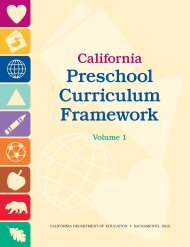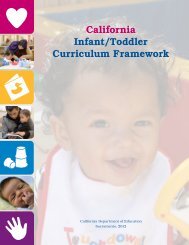Infant Toddler Learning & Development Foundations
Infant Toddler Learning & Development Foundations
Infant Toddler Learning & Development Foundations
Create successful ePaper yourself
Turn your PDF publications into a flip-book with our unique Google optimized e-Paper software.
espond to adults and engage with<br />
them first through predictable interactions<br />
in close relationships with parents<br />
or other caring adults at home<br />
and outside the home. Children use<br />
and build upon the skills learned<br />
through close relationships to interact<br />
with less familiar adults in their<br />
lives. In interacting with adults, children<br />
engage in a wide variety of social<br />
exchanges such as establishing contact<br />
with a relative or engaging in storytelling<br />
with an infant care teacher.<br />
Quality in early childhood programs<br />
is, in large part, a function of the<br />
interactions that take place between<br />
the adults and children in those<br />
programs. These interactions form<br />
the basis for the relationships that<br />
are established between teachers and<br />
children in the classroom or home<br />
and are related to children’s developmental<br />
status. How teachers interact<br />
with children is at the very heart of<br />
early childhood education (Kontos<br />
and Wilcox-Herzog 1997, 11).<br />
Relationships with Adults<br />
Close relationships with adults<br />
who provide consistent nurturance<br />
strengthen children’s capacity to<br />
learn and develop. Moreover, relationships<br />
with parents, other family members,<br />
caregivers, and teachers provide<br />
the key context for infants’ socialemotional<br />
development. These special<br />
relationships influence the infant’s<br />
emerging sense of self and understanding<br />
of others. <strong>Infant</strong>s use relationships<br />
with adults in many ways:<br />
for reassurance that they are safe,<br />
for assistance in alleviating distress,<br />
for help with emotion regulation, and<br />
for social approval or encouragement.<br />
Establishing close relationships with<br />
adults is related to children’s emotional<br />
security, sense of self, and evolving<br />
understanding of the world around<br />
them. Concepts from the literature on<br />
attachment may be applied to early<br />
childhood settings, in considering the<br />
infant care teacher’s role in separations<br />
and reunions during the day in<br />
care, facilitating the child’s exploration,<br />
providing comfort, meeting physical<br />
needs, modeling positive relationships,<br />
and providing support during<br />
stressful times (Raikes 1996).<br />
Interactions with Peers<br />
In early infancy children interact<br />
with each other using simple behaviors<br />
such as looking at or touching<br />
another child. <strong>Infant</strong>s’ social interactions<br />
with peers increase in complexity<br />
from engaging in repetitive or routine<br />
back-and-forth interactions with peers<br />
(for example, rolling a ball back and<br />
forth) to engaging in cooperative activities<br />
such as building a tower of blocks<br />
together or acting out different roles<br />
during pretend play. Through interactions<br />
with peers, infants explore<br />
their interest in others and learn<br />
about social behavior/social interaction.<br />
Interactions with peers provide<br />
the context for social learning and<br />
problem solving, including the experience<br />
of social exchanges, cooperation,<br />
turn-taking, and the demonstration<br />
of the beginning of empathy. Social<br />
interactions with peers also allow older<br />
infants to experiment with different<br />
roles in small groups and in different<br />
situations such as relating to familiar<br />
versus unfamiliar children. As noted,<br />
the foundations called Interactions<br />
with Adults, Relationships with Adults,<br />
Interactions with Peers, and Relationships<br />
with Peers are interrelated.<br />
9<br />
SOCIAL-EMOTIONAL DEVELOPMENT
















